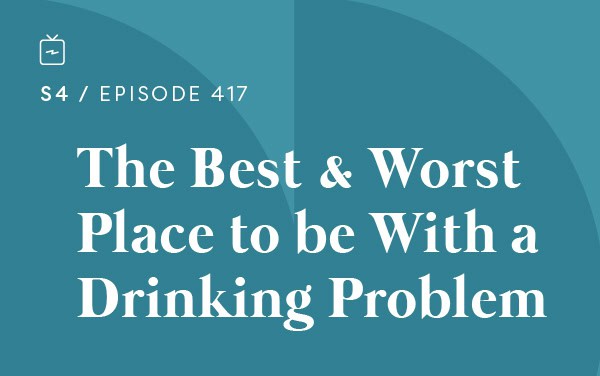
by Kris Oyen | Feb 13, 2023 | Podcast
Podcast: Play in new window | Download
Subscribe to the Recovery Elevator Podcast Apple Podcasts | | More
Episode 417 – The Best and Worst Place to be With a Drinking Problem
Today we have Jenny, she is 36 from Hudson, WI and took her last drink on 2/16/2020.
Shout out to our Café RE hosts! They do an amazing job.
If you are interested in joining, click the link and use the promo code OPPORTUNITY to wave the setup fee.
[02:45] Intro Summary:
When Paul describes the best and worst places to be with a drinking problem, they both look a lot alike.
That realization that alcohol no longer serves us, but we can’t imagine life without it can be a scary place to be. Alcohol has us right where it wants us. It may feel like part of you is dying, that feeling is grief.
But on the flip side, when we realize that alcohol no longer serves us, we can see that as an invitation to live the life we were meant to live. We are at the tipping point about to embark upon the greatest journey in our life.
We are all right where we need to be. Life will keep giving us the same lesson until we are ready to learn or make a change. By making that first jump into the unknown, you give others courage to do the same.
Better Help: www.betterhelp.com/elevator – 10% off your first month. #sponsored
[10:15] Paul introduces Jenny:
Jenny is 36 and lives in the small town of Hudson WI. She is married and they have one son together. She works in education and enjoys the outdoors – camping, backpacking, she also enjoys gardening, yoga and in recovery she learned that she likes to read.
Jenny’s drinking started when she was just 11 years old. A traumatic event that she didn’t share with anyone had her feeling alone and out of place. Jenny realized she loved drinking right from the start. She grew up aspiring to be the bad girl with the tough persona because it helped her put up a guard to protect herself. She enjoyed drinking and was willing to try any other drugs.
When she was 20 her and her boyfriend moved to Montana. She thought she could escape her issues, but that didn’t work. Her addictions got worse and while she would quit some things, the alcohol remained which helped her believe that she didn’t have a problem because drinking was socially acceptable.
At age 30, she lost a pregnancy and her drinking evolved from drinking for fun to being self-destructive. She later got pregnant again and her son was born 18 months later. She still struggled to quit drinking during pregnancy and since her doctor told her it was ok, she saw that as a green light to keep drinking.
When their son was 7 weeks old, they moved back home from Montana to their hometown to be close to family. In debt, postpartum with no job, the lived in her in-law’s basement and her drinking got really bad. No one called her out because drinking was all part of the culture.
Her turning point was after Super Bowl Sunday when she had crippling anxiety the day after and ended up staying in bed for two days with very dark thoughts. There is a history of suicide in her family and that is what stopped her from that path.
She says she was sober from alcohol for the first 14 months but doesn’t feel like she was in recovery. She ended up going to AA in April of 2021 and hasn’t looked back.
To her, there is a big difference between being sober and being in recovery. She is doing things that she likes to do instead of just not drinking. She feels like every day is a victory and she counts every day as it helps motivate her. At first, she had a hard time letting go of the old persona, but now she has let go of that and has redefined who she is. She loves mornings now and is doing well in her job. She also loves yoga and attends AA meetings frequently as well as other online community events.
Connect with Cafe RE – Use the promo code OPPORTUNITY to waive the set-up fee.
Recovery Elevator YouTube – Subscribe here!
Sobriety Tracker iTunes
Recovery Elevator
I love you guys
We can do this.
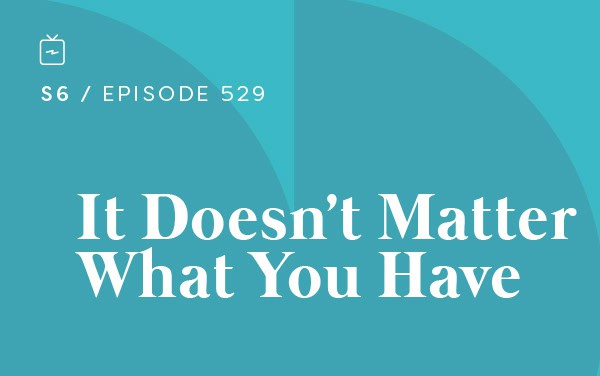
by Kris Oyen | Apr 7, 2025 | Podcast
Podcast: Play in new window | Download
Subscribe to the Recovery Elevator Podcast Apple Podcasts | | More
Today we have Jenny. She is 38 years old from Hudson, WI and she took her last drink on February 16, 2020.
Sponsors for this episode include:
Better Help – 10% off of your first month
Recovery Elevator has a nonprofit called Café RE which is our alcohol-free community. For all of our happenings and what we offer, click on Recovery Elevator Events.
[02:35] Thoughts from Paul:
It doesn’t really matter what word or label we attach to our relationship with alcohol. It doesn’t matter what we call it; we still need to do something about it. Paul says that his own pursuits of solving the “why” behind his drinking and how his addiction took hold has been a revealing journey of self-discovery even he won’t be able to pin down exactly why he crashed and burned so hard.
When we relentlessly scour the past for reasons why we drink, we take our energies away from the only moment where true healing and peace reside, which is this very moment right now.
Addiction does everything it can to pull us from the present moment. Ruminating on what happened, what you have tends to be fruitless. Befriend and make peace the part of you that seeks oblivion and self-destruction. An addiction path may be what our souls choose in hopes of teaching us what really matters in life.
[09:03] Paul introduces Jenny:
Jenny is a previous guest and was featured in Episode 417 back in 2023 after celebrating three years alcohol-free.
Jenny is married and they have a seven-year-old son. She enjoys exercise, adventure and being outside. She does professional development for the construction industry.
Jenny drinking when she was 11 years old with the goal of being a rebel. She says she had a goal of being a tough, naughty girl and says it let her down the road to 22 years of binging and going on benders with alcohol and drugs.
In her late twenties, Jenny had a miscarriage and says that it was at that point that she knew she had a problem, and she didn’t think she’d be able to stop. She and her husband had their son in 2017 and decided a life change was needed so they moved back home after living out west for a while. She was 31 years old, unemployed, had a newborn son and was deeply in debt. The move to her in-law’s basement and being back in her hometown opening old wounds drove Jenny to use alcohol more and more to escape.
Rock bottom came for Jenny after Super Bowl Sunday 202. She got very sick while driving and called out of work. For the next few days, she was hungover and thinking about ways to end things. A spiritual awakening and vision of an uncle that had passed away before she was born, led Jenny to get up and decide enough was enough.
Jenny says the first week was hard like ripping a bandage off and bleed profusely. All aspects of her life needed to be explored. She wanted to live a life of integrity and knew she needed to do the right things for herself. She feels like every day is a victory for all of us on the journey.
After a year without alcohol, her husband encouraged her to find connection and she tried AA. That group helped her define her higher power and she loves AA and the 12 steps. She finds that friendships in recovery are so much deeper.
In the last few years since she was on the podcast, Jenny says not much has changed but life is more stable now. When she quit drinking, she was able to address other issues that she wasn’t aware she had. She is capable of just being and seeking peace in her life.
Jenny knows that relapse is a non-negotiable for her. She says she hasn’t come this far to only come this far. Being able to tell the whole story about things that happen is important to her.
Recovery Elevator
You took the elevator down. You got to take the stairs back up.
We can do this.
Café RE
RE on Instagram
RE merch
Recovery Elevator YouTube
Sobriety Tracker iTunes
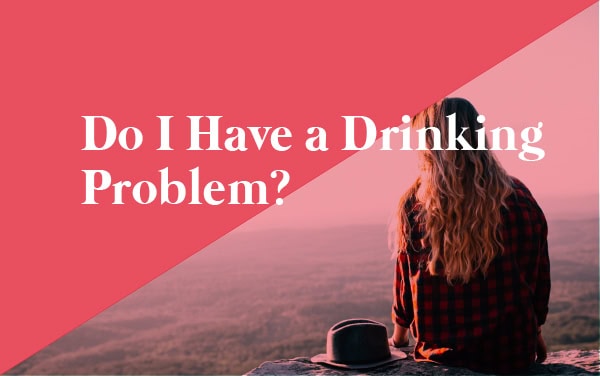
by Kerri MacFarlane | May 15, 2023 | Alcohol Free, Blog, Helpful Tips, Resources
Today is the day! Today is the day we are going to find out if you have a drinking problem…or not. Are you ready?
For Paul, when it finally sunk in that he did indeed have a drinking problem (and a good one at that!) two things happened.
First…he was like, “Oh F&#K!”
Then…immediately after, as this truth spread into his body, to his bones, to his conscious, his unconscious, to the heart, to the liver, something neat happened. An incredible amount of energy was instantly liberated.
For two reasons.
- The stigma or label of an alcoholic didn’t change who he was. He was still alive.
- But more importantly…all the energy, the incessant thinking he had of…
- Do I drink, or not?
- Do I have a problem, or not?
- How am I going to control my next session of drinking?
- How am I going to hide it?
- Let’s do our best not to black out before 8 pm.
- Do I have enough shitty box wine back home?
- Let’s not let people know we’ve already had 9 drinks before meeting up at the bar.
ALL of that went away instantly.
In fact the worst place a person can be with a drinking problem is in limbo. The do I or don’t I phase. (Paul covers this in Episode 417).
So for this diagnostic, we are going to use the test listed in the DSM 5, or the diagnostically statical manual which is what most psychologists and/or therapists have somewhere on their shelves.
There’s 11 YES or NO questions. If you answer YES to 2 of the questions, if you meet 2 of the 11 criteria, within the past 12 months, they call it an Alcohol Use Disorder.
THE TEST
- Do you sometimes have difficulty controlling how much you drink or for how long you drink alcohol?
- Have you made unsuccessful attempts to cut down your drinking?
- Do you sometimes spend a significant amount of time drinking or recovering from drinking?
- Has your alcohol use had any negative consequences at home, school, or work? (Have you ever lost time off work because of your drinking?)
- Has your alcohol use had any negative consequences to your relationships or social life? (Have you ever concealed how much you drink? Has anyone ever commented on your drinking?)
- Have you continued to use despite any negative consequences?
- Have you put off things or neglected to do things because of your alcohol use? (Have you ever disappointed your family or friends? Have you ever missed a family event?)
- Do you occasionally have strong cravings for alcohol?
- Has your tolerance for alcohol increased? Are you able to drink more than you did before?
- Have you experienced withdrawal symptoms the next day after drinking? (Have you ever been shaky or sweaty that evening or the next day?)
- Has your alcohol use led to any dangerous situations? (Have you ever been charged with impaired driving?)
Paul has always strived to be a good student, and was “happy” to report a score of 100%. 11/11. For shits and giggles, let’s’ cover what it means if you didn’t ace this like he did.
WHAT IT ALL MEANS
The presence of at least two of these symptoms means you have an AUD. If you have two to three symptoms, it’s considered mild; four to five symptoms is considered moderate; six or more symptoms is considered severe. (If you don’t fall into the severe category, a mild diagnosis can still warrant concern, as it may be the start of a larger problem.)
A couple things before we wrap this up. If you have a drinking problem, life isn’t over…in fact, it’s just beginning.
Some of you may have just learned you have a drinking problem. If this is devastating to you, go to Episode 411 where Paul talks about the grateful alcoholic.
Paul had one more bit of info in his notes from Episode 428 If you find yourself listening to a sobriety podcast (or reading this blog), and you’re not a therapist, a doctor, or listening so that you can support a loved one, then YOU have a drinking problem. If you question whether or not you have a drinking problem, you just answered that question. The bigger question is…what are you going to do about it?
***Taken from Recovery Elevator Podcast, Episode 428, host Paul Churchill***
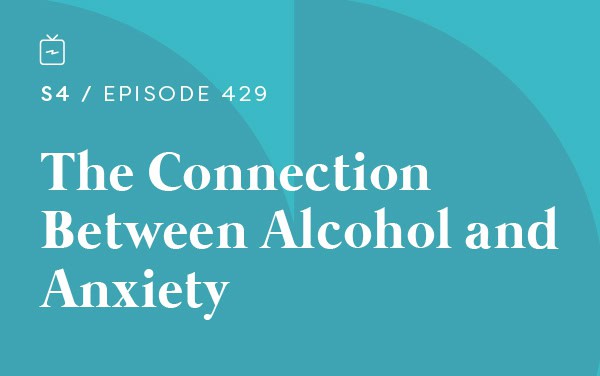
by Kris Oyen | May 8, 2023 | Podcast
Podcast: Play in new window | Download
Subscribe to the Recovery Elevator Podcast Apple Podcasts | | More
Episode 429 – The Connection Between Alcohol and Anxiety
Today we have Dale, he is 55, from Roanoke, VA and he has been alcohol free since March 23, 2019
Exact Nature: https://exactnature.com/RE20
[02:34] Paul’s thoughts:
Paul knows now that there is a connection between his drinking and his anxiety but while actively drinking, he could not. We are told that alcohol relaxes us – which it does by shutting down important parts of our brain.
According to Dr. Sheila Shilati,”Alcohol ultimately replaces those important chemicals like dopamine and serotonin in the brain, which mitigate anxiety, therefore, in episodes where you are not drinking, then your brain is searching for those all-important ‘feel-good’ connections, which become diminished because the supply has been mitigated,”
We hear a lot about “self-medicating” in recovery. Which isn’t a bad thing, but when we rely too much on this strategy, it stops working. This becomes an even bigger problem because we don’t realize it so we just drink more and now our coping strategy is becoming the reason we can’t cope.
Paul shares in episode 417, this is the best place you can be because the tipping point isn’t far off in the distance.
Better Help: www.betterhelp.com/elevator – 10% off your first month. #sponsored
[10:48] Paul introduces Dale:
Dale is 55, lives in southwest Virginia, has been married for 25 years with no children. He works for a shipping company and also owns and manages rental property. Dale enjoys music of all varieties, loves reading and learning and also enjoys gardening.
Dale’s first experiences with alcohol came from his parents using it to medicate him as a child. He worked in the hospitality industry in his late teens and early twenties and drinking was a glorified part of the lifestyle. His tolerance grew and he became a daily drinker throughout that time.
The recent years found Dale questioning his drinking and realizing he wasn’t living life within his values. He had sneakily drunk some of his wife’s special whiskey which prompted an angry text to Dale. He used this message as motivation and although he was not able to quit right away Dale feels this was the start of his recovery.
Dale has found self-awareness to be a catalyst to helping him stop drinking. He has utilized Recovery Elevator and the Café RE community as a large part of his journey. It was a scary first step for him, but he found getting out of his comfort zone to be very helpful. He has made many friends that have helped him move forward and be strong in his sobriety. Focusing on the good has been an important tool for Dale, specifically in the early days. As he closed in on a year, he felt the veil had been lifted and he was seeing the world differently.
Year two for Dale was unpacking everything that led him to drink so much in the first place. He feels that was the mucky part of the journey and it is a process to unpack it.
Year three Dale feels that learning to let go of control was a big thing. Learning that life is going to happen, and he didn’t have to cling so tightly to everything. He finds that the service work he does in the community has helped him deal with life as it happens while approaching the four-year milestone.
Dale feels that success comes by building the wall one brick at a time, stepping outside of the comfort zone and being willing to learn. He also feels that service work helps strengthen us and keep us connected to our foundation.
[53:36] Closing thoughts:
Paul’s tips for dealing with anxiety without alcohol:
Perception – anxiety pangs are messengers. Your body is sending you signals that something is off balance. Tell your body this will pass and will soften with each passing day or month.
Get the body moving to cue the release of endorphins whose purpose is to mask physical and emotional pain.
Cafe RE Use the promo code OPPORTUNITY to waive the set-up fee
Recovery Elevator YouTube
Sobriety Tracker iTunes
Recovery Elevator
It all starts from the inside out.
I love you guys
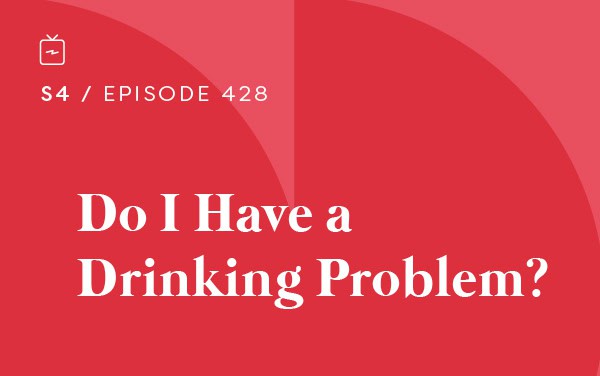
by Kris Oyen | May 1, 2023 | Podcast
Podcast: Play in new window | Download
Subscribe to the Recovery Elevator Podcast Apple Podcasts | | More
Episode 428 – Do I have a Drinking Problem?
Today we have Lauren, she is 54 from Rochester NY, and took her last drink on November 19, 2022.
Shout out to Ty with 15 YEARS alcohol free! Thank you for all you do for RE!
Shout out to Bradley from south Denver with 3 days alcohol free! Great job!
Café RE is a private online unsearchable recovery community. Get accountable and be the best version of you. Together is always better! Use promo code OPPORTUNITY to waive the setup fee.
[03:23] Intro summary:
In the past Paul has talked about the worst place a person can be with a drinking problem is in limbo (episode 417). But how do we find out if we actually have a problem so we can get out of that space?
There is a test listed in the DSM-5 to determine if we have a drinking problem or not. There are 11 questions, and you must meet two of them within the past 12 months to have what is called Alcohol Use Disorder. It’s not hard to determine if you have a drinking problem based on that test.
But at the end of the day, it can be as simple as if you question if you have a drinking problem, you just answered your own question.
Better Help: www.betterhelp.com/elevator – 10% off your first month. #sponsored
[12:36] Kris introduces Lauren:
Lauren has been sober almost 4 months at the time of recording. She lives in Rochester New York, she is married, has two adult children, one granddaughter, has pets and owns her own business helping the elderly. She enjoys time outside, crafting (currently diamond painting), reading and learning new things.
Lauren was always fascinated with alcohol, but it wasn’t prevalent in her immediate family. When she was 16, she was able to purchase alcohol for her and her friends. She had a lot of fun and thought it was cool. She chose the college based on their drinking culture; she drank heavily but still did well in school. After college she got married, had two kids and a successful job. She drank the same as other parents around her, so she felt that was normal. She was able to abstain when she had her children and feels her drinking was more or less recreational for a long time.
Over the years Lauren hadn’t really tried to quit drinking. She would make a halfhearted attempt at Dry January, but it didn’t last. She didn’t think it had anything to do with being addicted. She feels that everyone else saw signs that her drinking was a problem, but she wasn’t aware of it.
After going on a very long-awaited vacation in 2022, Lauren says she had a hard time coming back to regular life and the stressors were magnified. Soon after, she drunkenly alienated a friend on Facebook, and it really impacted her when the friendship ended. She started drinking to escape everything that was bothering her. Lauren had a scare during her third blackout in eight days and decided to go to the doctor where she told them everything. She was sent to an outpatient program to start the next day.
She has found a lot of tools and inspiration through the outpatient program. Lauren says AA didn’t resonate with her, but she does do SMART recovery online which she enjoys. Connecting with others has been a great resource for Lauren as well. She views her drinking and recovery as just part of her, she doesn’t feel it defines her. Lauren recognizes that she is happier and communicate better with her husband. Her family is relieved and proud of her for going into recovery.
[57:20] Outro:
Spring is here! And with seasonal changes come new challenges. Kris feels that it is a chance for him to make sure he has his accountability in place and has a plan when it comes to spring and more outdoor events. Don’t stress about upcoming events, simply be aware of what is out there. Set yourself up to enjoy the weather and reach your alcohol-free goals.
Recovery Elevator YouTube
Sobriety Tracker iTunes
Recovery Elevator
We’re the only ones that can do this, but we don’t have to do it alone.
I love you guys.







